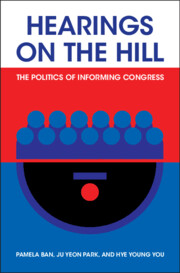Book contents
- Frontmatter
- Dedication
- Contents
- Figures
- Tables
- Acknowledgments
- 1 Members of Congress Are Politicians, Not Experts
- 2 Committee Hearings and Information Provision in Congress
- 3 Who Testifies in Congress? New Data on Congressional Hearings and Witnesses
- 4 Not All Information Is Equal
- 5 When Committees Seek Out Information for Policy Development
- 6 How Control of Government Shapes Information Exchange
- 7 Congressional Capacity and the Search for Specialized Information
- 8 Conclusion
- Appendix A
- References
- Index
4 - Not All Information Is Equal
How Witnesses Vary in What They Provide to Congress
Published online by Cambridge University Press: 21 November 2024
- Frontmatter
- Dedication
- Contents
- Figures
- Tables
- Acknowledgments
- 1 Members of Congress Are Politicians, Not Experts
- 2 Committee Hearings and Information Provision in Congress
- 3 Who Testifies in Congress? New Data on Congressional Hearings and Witnesses
- 4 Not All Information Is Equal
- 5 When Committees Seek Out Information for Policy Development
- 6 How Control of Government Shapes Information Exchange
- 7 Congressional Capacity and the Search for Specialized Information
- 8 Conclusion
- Appendix A
- References
- Index
Summary
This chapter explains the methodological approach behind the measurement of analytical information in witness testimonies. Focusing on House hearings from the 105th through 114th Congresses, the methodological approach quantifies technical information relevant to policymaking – analytical information – and shows how witness affiliations can capture meaningful differences in the amount of analytical information that witnesses provide Congress in committee hearings. Bureaucrats and research-affiliated witnesses excel in delivering analytical testimony, while citizens and religious institution representatives provide the least. The patterns in this chapter demonstrate that not all testimony provides the same type of information and that committees may receive different amounts of analytical information depending on the types of witnesses they invite. Taken together, the findings and patterns illustrated in this chapter motivate our argument that the composition of witnesses has important implications for committees, as witness invitations not only indicate from whom committees choose to hear but also signify the different types of information committees may ultimately receive.
- Type
- Chapter
- Information
- Hearings on the HillThe Politics of Informing Congress, pp. 53 - 77Publisher: Cambridge University PressPrint publication year: 2024

